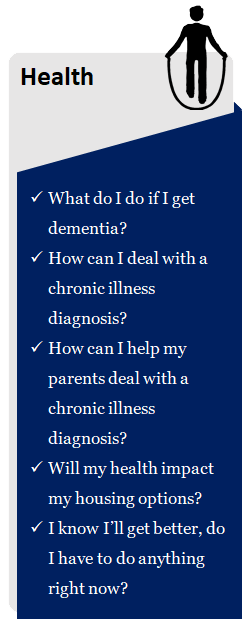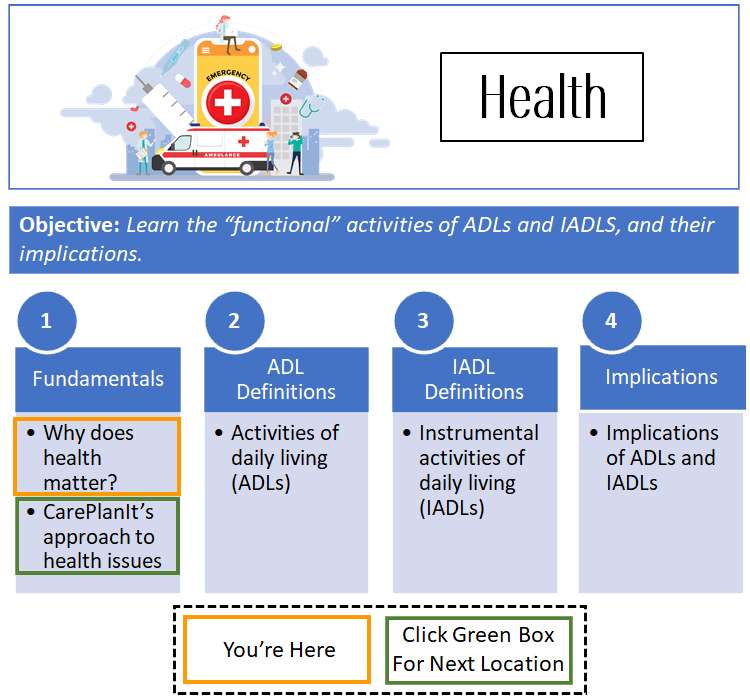Health From A Functional Perspective
Click here to see what's on this page.
Regarding health, CarePlanIt discovered that Super Agers view it differently than other seniors: they view health from a functional perspective. Super Agres view health as functional. If they have illnesses, they ask, “How does this illness affect my day-to-day life.” In other words, they want to know how their illness impacts everyday life. They know they can’t cure cancer, but they can make changes to remain mobile and in their home.
Super Agers View Health From A Functional Perspective

Get your Doctor friends to help with the diagnosis and treatment options. Get help with the affects (manifestations) of the health condition from everyone else.
Steve & Carmen Glovsky
CarePlanIt views health and home health care needs from a functional point of view. Don’t diagnose conditions; assess how the condition affects a senior’s everyday life. In other words, you need to ask some basic “ability” questions like, can the senior:
CarePlanIt helps seniors and their families address ability issues from a specific framework. Studies show that as we age we have different needs. Knowing what these needs are, or will be in the future, will help seniors to stay home for as long as possible.
The Functional Perspective On Health Impacts All Care Needs
Regardless of what starts the conversation for home care, the approach should be the same – an assessment of the senior’s needs. See the ensuing sections on health definitions, ADLs, IADLs and their implications. Keep in mind the main issue of the help seniors need to stay home.
Common Health Questions

As Agers, we have different health concerns than non-seniors. The concern focuses on staying independent, living in our own home, and remaining autonomous.
If we’re the children or caregivers of Agers we have different concerns. We want to help Agers make what we think are good decisions. It’s also important to keep them safe and functional. We want to make sure they take their medication and make all their doctor appointments.
Turns out that Agers, children, and caregivers often have trouble getting on the same page.
CarePlanIt knows why. Learn our Health Technique so you can understand too.
Health is a big topic. If Carmen and I were talking to young adults, we’d spend our time discussing ways to ensure your health and ward off illness. That’s what health means, after all, being free from illness and injury. We’d focus on making you strong and healthy. We’d discuss exercise, healthy eating, and lowering stress. But in our seventies and eighties, things change.
As We Age, We Decline Physically & Mentally
As we age, almost everything about us degrades. We decline cognitively, physically, and mentally. Our brain literally disintegrates. Our bones shrink and lose density. We lose muscle mass. Home health care is a way to supplement what we can do ourselves with help from others.
If you want evidence of your loss of energy, ask yourself if you’d be interested in the following:
Rarely do we lose our love of children as we age. The opposite is true. But our ability and desire to take care of the daily needs of young children diminishes in our seventies and eighties. We simply don’t have the energy, strength, or mental alacrity.
Some seniors keep doing what they did in their thirties, forties, and fifties. They exercise regularly, lift weights and eat healthily. Here’s what’s interesting about this group. They aren’t changing a thing. They are simply continuing a thing they’ve always done. And that’s great. But what’s happening is habituation. Not work. Work is effort, an exertion of energy. As we age, we lose energy. That’s why doctors, nutritionists, and trainers try and build good habits as early as possible. Habits we can often maintain. Even as we age.
The Example Of Home Health Care
Home care is one of the biggest concerns for seniors and their families. Seniors don’t want to leave their homes. Most children want their parents safe and aspire to help their parents remain safe. The way to evaluate the need for home care is from a functional perspective. Let’s look more closely.
Use A Functional Perspective Of Health To Assess Needs For Home Care
Most seniors decline physically and cognitively over time. These crate challenges for seniors that want to stay home (i.e., age in place). The challenges come to a head in three common areas: hospital visits, unkempt homes, and cognitive decline. Emergency concerns usually surround broken bones, heart disease, and illness. Staying home concerns involve home maintenance, safety, and independent living. Cognitive decline involves dementia and its subsets like Alzheimer’s.
Functional Health Concerns & Emergencies
Emergencies are events involving hospital visits. The visits usually involve broken bones, concussions, and heart disease. Some of the issues are short-term. Bones can heal, and heart disease can be treated and controlled. Some emergencies involve chronic and debilitating issues like injuries and diseases where a senior loses mobility or permanently needs a walker. If the senior has permanent issues with mobility, this needs to be addressed for the senior to stay home.
Functional Health Concerns & Staying In My Home
Seniors’ number one concern is staying in their home. But as we age our ability to stay home goes down. We may have difficulty maintaining the house, navigating steps and hallways, using showers and baths, paying bills, going to the grocery store, and preparing meals. Some of these issues can be mitigated. Bathrooms can be made safer with handrails and non-slip mats and rugs. Elevators can be installed to help a senior navigate stairs. Other issues cannot be easily mitigated. Once a senior cannot shop, pay bills, make meals, and do laundry, they can’t manage their household on their own.
Functional Health Concerns & Dementia & Alzheimer’s
An area seniors and their families fear most is cognitive decline. Once s senior starts forgetting things, all kinds of bad things can happen. The most common are house fires. A senior forgets that have something on the stove and the kitchen catches fire. Other issues are car accidents and forgetting how to get home. If the senior has permanent cognitive issues, these need to be addressed for the senior to stay home.
Will My Health Impact My Ability To Stay In My Home?
Most seniors aren’t concerned about the upcoming marathon or competing in a cross-fit contest or triathlon. An Ager’s number one concern about their health is, “Am I healthy enough to stay in my own home?” In other words, Carmen and I learned in our conversations with seniors that their health concerns weren’t about health, they were about how health impacted their ability to stay in their own home.
Manage Health Functionally, And Your Can Stay Home
CarePlanIt’s view of health focuses on this desire: the help seniors need to stay home. The Master Technique we call “Health” is all about our ability to perform tasks. The tasks needed to stay in our own home. It’s natural to lose abilities that allow us to stay in our homes. But we can supplement those abilities with the right home care.
Generally, when asked publicly, seniors say they feel good about being able to stay in their home. They also say their money will last. We heard common sentiments: “If my health stays good, my wife and I will be able to stay in our home for the rest of our lives,” and “If we stay healthy, our money will last.”
Our Health Declines Over Time
Carmen and I discovered that tying health to aging success was almost universal among the interviewed seniors. So was optimism about health. Several studies have revealed most seniors believe their health will stay the same or improve over time. In reality, this is not true. Fifty percent of seniors have at least two chronic conditions, like diabetes and heart disease. Half of these seniors have three or more chronic conditions. In other words, most seniors have no idea of the home care they will need to stay in their home.
Super Agers View Health From A Functional Perspective
There is one group of seniors, those we call Super Agers that viewed health a bit differently. They almost all had stories of how their parents had been healthy until they retired. After retirement, they had all kinds of ailments that impacted their mobility. Shopping, cooking, cleaning, and bathing all became problematic. Lots of other people had to step in to help. Lots of unexpected money was spent. Many Super Agers also noticed something else. The age they expected their parents to live to, didn’t change; just their condition. That condition required much more of their money, their children’s money, and derivatively, their grandchildren’s money.
A Functional Perspective Coincides With Actual Day-To-Day Needs
These Super Agers weren’t emotional or overly optimistic about their health. Instead, they viewed their future health in terms of how it would impact their day-to-day life. If they had diabetes, they asked how that disease might affect their mobility, and in turn, their additional care needs. In other words, they looked at the manifestation of how a health condition, impacted their daily life. If they needed help, they got the home health care they needed. You can learn about these and other issues here.
This is how CarePlanIt views senior health issues: as their impact on a senior’s day-to-day life.
